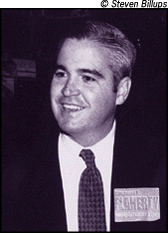June 15 - 22, 2000
![[Features]](/standard/image/headers/features_header.gif)
City Hall
Man in the middle
by Ben Geman
This summer could be sticky for first-term at-large city councilor Michael Flaherty of South Boston. Even as the struggle over the neighborhood's share of waterfront-development benefits lurches toward uneasy resolution, the rookie councilor with the South Boston base and citywide constituency could get burned by the volatile controversy.
Flaherty wasn't part of the 1998 deal that steers more than half the linkage payments from South Boston Waterfront developers, as well as other "community benefits," toward the neighborhood through the South Boston Betterment Trust, a group picked largely by neighborhood elected officials. But Flaherty's in a tough spot nonetheless now that Mayor Tom Menino, shamed by the Boston Globe's blowout coverage of the deal, wants to curb the power of Southie officials to call the shots on development benefits. Flaherty's a favorite son of South Boston, where he topped the ticket in the 1999 election for city council. Yet he also represents the entire city, something he'll have to consider as he addresses a lopsided, insider-driven arrangement that's come under fire from housing and neighborhood activists. Complicating things further, Flaherty's election was backed by elected leaders in Southie and behind the scenes by Menino. Want more? Flaherty PR guy Steve Crawford is also representing the South Boston Betterment Trust.
Flaherty's kept a low profile so far -- he declined to speak or take the stage at Tuesday's packed and raucous South Boston community meeting on the development issues. (His two at-large colleagues in attendance didn't talk either.) Reached by the Phoenix last week, Flaherty wouldn't say whether he thought the 1998 deal was fair, delving instead into mushy process-speak. In a prepared statement, Flaherty says he supports the idea that "the entire city should benefit from a fair and equitable distribution of waterfront development linkage money," but that "no neighborhood should benefit more than the impacted community of South Boston." He adds that the "memorandum of understanding" (MOU) that steers more than half the linkage cash to South Boston merely sets a "goal" and doesn't supersede the city's linkage program. Linkage fees are city-mandated payments by commercial developers for affordable-housing and jobs programs.
"At the same time, [South Boston] has to generate feasible proposals for housing creation for the community, and at the same time other neighborhoods across the city can and should be trying to generate feasible proposals," he says. In stressing that the MOU is a "goal," Flaherty seems open to the idea that South Boston won't necessarily collect all the linkage called for by the memorandum. Maybe he'll get a pass now that Menino's begun meeting City Councilor James Kelly of South Boston, State Senator Stephen Lynch, and State Representative Jack Hart in negotiations that could alter the provisions of the deal, including the linkage agreement. Still, the pols are not near a resolution, and the situation could deteriorate easily.
In a sign of the delicate spot he's in, Flaherty is reluctant to discuss some of the core issues. Tellingly, he would not say whether he thought the "goal" was appropriate, a question all city officials should address as development proceeds. On the question of the more-ambiguous "community benefits" that the MOU allows the Southie political establishment to extract from developers, Flaherty says any concessions made by developers are voluntary -- as if developers could simply ignore the pols and their designees without consequence.
It would be unfortunate if Flaherty's failure to articulate a strong position here foreshadowed a retreat from the promise of his strong, liberal-leaning campaign of 1999, when he cobbled together a citywide coalition that included such progressive activists as Mimi Turchinetz along with support from his hometown base. The linkage blowout is messy, but it's also an opportunity for Flaherty. He can still fulfill the promise of his campaign and fight to ensure, for example, that community organizations throughout South Boston help shape the neighborhood's development benefits.
"I think that he is a person who could bridge some of the gaps," says Marty Nee, former head of the South Boston Neighborhood Development Corporation, who's been critical of the Betterment Trust. "Mike Flaherty has the knowledge and, frankly, the vision to see that . . . other needs, both inside and outside [South Boston], need to be at the table."
Adds Nee: "I would like to see him forcefully get out in front. This could make him. He could show his mettle on a tough issue." But whether he will remains to be seen.

